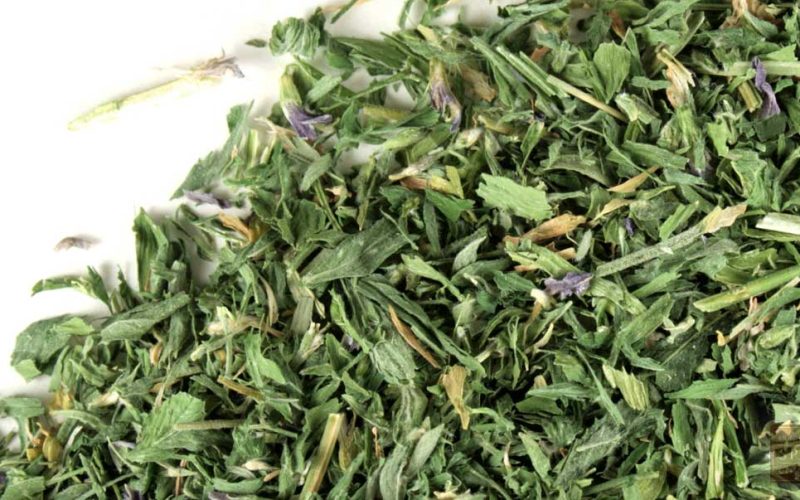Alfalfa has a lot of interesting health benefits. This wonderful herb is well known for its ability to protect your heart and improve digestion. It helps control your levels of cholesterol.
Alfalfa improves respiratory health, it boosts your immune system, hastens healing, lowers inflammation, and detoxifies your body. Alfalfa has also been proven to contain anti-cancer properties.
This herb is found worldwide. In Europe and other countries, it is called Lucerne. Its impressive nutritional profile has given alfalfa a spotlight in the natural world of healing.
It is now recognized globally and has a lot of uses. There are now alfalfa supplements and teas. All thanks to its amazing nutrient profile and healing properties.
The hay of alfalfa is even used to feed animals and livestock. Alfalfa sprouts are an important staple crop for humans also.
Health Benefits of Alfalfa
It is nutritious
Alfalfa is dense in nutrients, both essential and non-essential nutrients. There are high levels of vitamins A, B, C, D, and E in alfalfa. There are also proteins and minerals in this herb.
An easy way to increase the levels of nutrients in your diet is to add alfalfa sprouts to your sandwiches and salads. It also contains fiber which will aid a healthy digestive system.
It also contains pure water, carbs, energy, little fat, and little sugars. Some of the minerals present in alfalfa are sodium, potassium, phosphorus, magnesium, iron, and calcium.
Phytochemicals like flavonoids, phytoestrogens, phytosterols, alkaloids, and coumarins are abundant in alfalfa.
It improves hair health
The rich content of amino acids in alfalfa prevent hair fall and strengthens hair. It also boosts the growth of hair. It treats hair thinning and falling hair.
This herb contains silica and this compound prevents baldness. It also contains vitamins B1 and B6. They boost hair growth. It also contains vitamin C which boosts the flow of blood to the scalp.
The antioxidants also work on the follicles of your hair and in the process, it boosts the production of collagen.
It boosts respiratory health
In natural medicine, alfalfa is used for respiratory infections and problems such as common cold, flu, bronchitis, and even viral infections.
The anti-inflammatory properties of alfalfa also help treat asthma and other breathing problems. These anti-inflammatory compounds strengthen your immune system and neutralize pathogens that cause infections.
It increases the production of breast milk
The phytoestrogen in this herb helps boost the production of milk in breastfeeding mothers. The rich content of nutrients contained in this plant also boosts the nutrition of the baby.
This will help the baby to grow well and develop properly. It also helps them develop a strong immune system.
It hastens healing
In traditional medicine, alfalfa poultice is applied to wounds and injuries for quick healing. This is also done to prevent infections. The antioxidants in alfalfa protect the affected area.
The minerals and other nutrients in alfalfa boost the flow of blood to the injury to hasten healing. The high content of protein in alfalfa also helps to boosts the repair, growth, and development of the skin.
It protects your heart
Alfalfa is rich in iron and potassium. These minerals have numerous benefits on your heart. Potassium helps dilate your blood vessels to increase the flow of blood.
This helps to reduce blood pressure and relieve the tension placed on your heart. This would reduce your risks of heart attack, high blood pressure, and stroke.
The iron in alfalfa enhances the production of red blood cells. This will boost circulation and make sure that every cell, tissue, and organ in your body are properly oxygenated.
This will prevent your heart from being under pressure to supply blood to your body. Your extremities will get enough blood and your heart won’t suffer due to intense pressure.
It reduces inflammation
In natural healing, alfalfa is used to treat arthritis and other diseases caused by inflammation. It is a storehouse of vitamins B and C, it is also high in antioxidants compounds and calcium.
All these help in fighting inflammation. It relieves inflammation around your body and even in your joints. This, in turn, would prevent oxidative stress, prevent chronic disease, and strengthen your immune system.
It fights diabetes
Alfalfa is not just an anti-diabetic agent, it improves your overall metabolic health. In a recent study, alfalfa supplements reduced the levels of bad cholesterol (LDL and triglycerides) in diabetic animals.
It improves the amount of glucose in the bloodstream. Alfalfa supplements even reduce the levels of sugar in the body by increasing the secretion of insulin from the pancreas.
It fortifies your immune system
The high content of vitamin C in alfalfa makes it a top immune-boosting food. This nutrient (vitamin C), which also serves as a powerful antioxidant improves the number of white blood cells in the body.
These cells fight diseases, pathogens, and invading microbes. As an antioxidant, vitamin C also eliminates oxidative stress from the body. The vitamins B and E in alfalfa are also antioxidants and metabolic regulators in the body.
All these help in boosting your immune system and preventing diseases. They also extend your lifespan.
It relieves the symptoms of menopause
Alfalfa contains high levels of estrogen. This is called phytoestrogen. They are similar to the hormone called estrogen chemically. This simply means that they can have the same effect as estrogen on the human body.
The issue of phytoestrogen is quite controversial. However, there are several health benefits of these compounds. One of the benefits is that they relieve the symptoms of menopause in women going through it.
Menopause symptoms are caused by hormonal imbalance, especially low levels of estrogens. Sage and alfalfa relieve night sweats and hot flashes in women.
These plant hormones also help women with breast cancer. It increases their rate of survival. There were also able to sleep better at night.
It reduces the levels of cholesterol
The impressive levels of fibers in alfalfa help control the levels of cholesterol. There is a rich amount of saponin in alfalfa, this phytochemical prevents cholesterol from sticking to the walls of the arteries and causing health problems.
This also helps in balancing the levels of HDL (good) cholesterol in the body. This will reduce your risks of plaques, atherosclerosis, strokes, and heart attacks.
It is a storehouse of antioxidants
The antioxidant property of this herb is responsible for its long use in traditional medicine. Due to this factor, alfalfa is used to treat diseases caused by oxidative damage and inflammation.
Alfalfa prevents DNA mutation, cell damage, and cell death caused by free radicals. It increases the ability of your body to fight these free radicals and it reduces the damage these free radicals cause in the body.
A study revealed that alfalfa can reduce the damages caused by brain injury and stroke.
It detoxifies your body
Toxins are one of the common leading causes of diseases and deaths. During toxin overload, the kidneys and liver will need help detoxing because they have been overwhelmed.
Alfalfa is a powerful diuretic due to its high content of clean water. It helps eliminates wastes and toxins from the kidneys. It is even used in the treatment of kidney problems.
It stimulates frequent urination and this helps in expelling wastes and toxins from the body. This would hasten the detoxification process and keep you healthy.
Apart from wastes and toxins, excess salts, water, and fats are also expelled from the body.
It aids weight loss
The fiber present in alfalfa can help control hunger and food intake. This will reduce hunger pangs and help you watch your weight. You would feel full for a long time.
The rich content of vitamins in this herb helps to increase metabolism. This will stimulate the metabolism of energy and increase the levels of energy.
Remember to consume these sprouts in moderation to prevent toxicity.
It improves the movement of bowels
Dietary fiber aids regular bowel movement and prevents constipation, indigestion, and other digestive problems. It optimizes your digestive system.
Fiber bulks up your stools, it hastens the movement of bowels, and this would prevent inflammation in your gut. Fiber also prevents bloating, diarrhea, cramping and boosts the population of probiotics in your gut.
Those who have regular constipation are advised to adopt a healthy diet and take alfalfa supplements too.
It prevents weak bones
The rich content of vitamin K in this herb benefits your bones. It builds stronger and healthy bones and prevents osteoporosis. Vitamin K is needed to activate osteocalcin, a protein that circulates in the blood.
This nutrient also improves the absorption of calcium. This, in turn, would prevent osteoporosis and other bone problems. You would have less risk of bone fractures.
It fights cancer
There are lots of phytochemicals in alfalfa which help in fighting and preventing cancers. The most abundant and impressive of these compounds are phytoestrogens.
These are very helpful to the body when battling cancer. They prevent mutations in your cells and DNA and they also act as antioxidants. This will reduce your risk of cancer.
Other active components in alfalfa bind strongly to carcinogens and expel them from the body. They also bind to toxins and carcinogens in the colon and expel them.
This would make your body free and healthy and your risks of cancer would be very low.
It relieves acid reflux and heartburn
Alfalfa is an alkaline food. This controls your pH level. This helps in the process of digestion. If you are having indigestion, your stomach would produce more acid for digestion.
This will lead to acid reflux and heartburn. This is caused by high concentrations of acids. Alkaline foods will reduce the levels of stomach acids and relieve these symptoms.
This also reduces your risk of painful gastric ulcers.
How to Consume Alfalfa
You can consume alfalfa in the form of powder, tea, or tablets. Be careful of the leaves, seeds, or extracts because it is still difficult to recommend an effective or safe dose.
Also, buy your herbs from a reputable store or company. Most herbal products contain ingredients that are not listed on the product label.
You can eat alfalfa sprouts. There are many ways to add these to your diet. You can mix it in a salad or put it in a sandwich. You can sprout your alfalfa seeds at home or you buy them from a reputable health store.
How to Sprout Alfalfa Seeds
Get the number of seeds you want to sprout and pour them in a bowl, sprouter, or jar. Get 2 to 3 times the amount of water and pour it over the seeds.
Leave these seeds to soak overnight or at least for 8 to 12 hours. Drain the sprouts and rinse them with clean and cool water. Try and remove all the water.
Store the sprouts at room temperature, out of direct sunlight. Leave it for three days. Then you rinse and drain them every 8 to 12 hours. On the fourth day, take the sprouts to a place of indirect sunlight for photosynthesis to take place.
Regularly rinse and drain them every 8 to 12 hours. Your sprouts are ready for consumption on the 5th or 6th day. There is a risk of bacterial infection, so you have to be careful.
Precautions
You have to consume raw alfalfa sprouts with care. Excess of it can harm your body. Alfalfa contains high amounts of anti-nutrients like canavanine and saponin.
In high amounts, these compounds can cause complications in your body. They prevent your body from absorbing nutrients in their foods. Pregnant women and women suffering from lupus should avoid alfalfa sprouts completely.
High levels of these anti-nutrients in your body would lead to toxicity. This would disrupt the balance of amino acids in your body. Excessive intake of raw alfalfa can cause inflammation and induce lupus-like symptoms because of these anti-nutrients.
Even when giving alfalfa to your livestock, it should be done with care and monitor the quantity they eat. If you can’t monitor the quantity they eat, then you have to eliminate it.
But you won’t have any problem if you eat this in moderation and prepare it properly. You can opt for the tablets if you want to be on the safe side.
The reason pregnant women should avoid alfalfa is that it can trigger contractions or uterine stimulations. People on blood-thinning medications should avoid alfalfa and its sprouts because it is high in vitamin K.
Though most people, especially those who are not on medication benefit from alfalfa. But avoid this if you are on blood-thinning medications like warfarin.
High doses of vitamin K make this drug ineffective. People with compromised immune systems should avoid alfalfa sprouts. The moist conditions that sprout the seeds of alfalfa are favorable for the growth of bacteria.
Sprouts sold in stores have a high risk of bacterial contamination. In the past, multiple outbreaks have been linked to alfalfa sprouts. You can become sick when you eat infected sprouts.
Healthy adults can recover in a short time but people with a compromised immune system would take longer. It can even be very serious.
Old people, little children, pregnant women, and people with a weak immune system (e.g. those with HIV, autoimmune diseases), should be careful with alfalfa sprouts.
References;
- Nutritional and health-related compounds in sprouts and seeds of soybean (Glycine max), wheat (Triticum aestivum.L) and alfalfa (Medicago sativa) treated by a new drying method SN
- Alfalfa seeds lower low density lipoprotein cholesterol and apolipoprotein B concentrations in patients with type II hyperlipoproteinemia SD ,ACS ,NCBI ,SL ,NCBI NCBI ,BMC
- Ethyl acetate extracts of alfalfa (Medicago sativa L.) sprouts inhibit lipopolysaccharide-induced inflammation in vitro and in vivo SN ,SD ,NCBI ,NCBI
- Composition and fiber digestion in morphological components of an alfalfa-timothy sward SD ,NCBI ,NCBI
- Minimizing the Saponin Content of Alfalfa Sprouts and Leaf Protein Concentrates SL ,NCBI ,NCBI
- Bactericidal effects of roselle (Hibiscus sabdariffa) against foodborne pathogens in vitro and on romaine lettuce and alfalfa sprouts WOL
- Phytoestrogen content of foods—a compendium of literature values NC , NCBI
- [Treatment of neurovegetative menopausal symptoms with a phytotherapeutic agent]. NCBI ,NCBI ,NCBI
- Herbal medicinal products during pregnancy: are they safe? NCBI ,NCBI ,FDA ,NCBI






